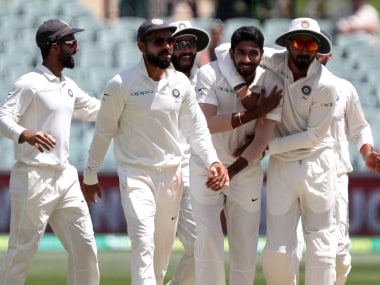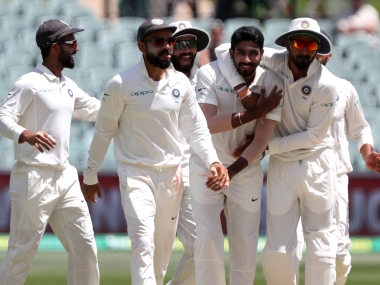Team effort Those are the two words India captain Virat Kohli stressed upon after India registered a first-ever Test series win on the Australian soil. Of course, he praised Cheteshwar Pujara too, and the bowling attack, for they played major roles in this historic victory. But ‘team effort’ was the only tune he was ready to sing. [caption id=“attachment_5707381” align=“alignleft” width=“380”]
 File picture of members of Indian team. AP[/caption] “For us, names on the honour board don’t matter,” said Kohli. While the captain is a champion player on an individual level, he has never exaggerated his own importance in the context of this Indian team. Instead, even on a rare occasion when the Indian team got across the line, he emphasised on the collective effort put across a span of 12 months. Perhaps it is down to a lot of issues (from South Africa and England) being sorted on this tour. Yes, there was the odd selection gaffe at Perth, but beyond that, nothing too worrying emerged in the other three Tests. In fact, the change in opening combination at Melbourne was forced too, for the team management tried to persist with the misfiring duo of KL Rahul and Murali Vijay for as long as possible. It is in this setting that you really find Kohli had his bearings right. “For me, Hanuma Vihari batting those 70-odd balls is as important as scoring a hundred,” underlined the captain. If there is one name indicative of giving all for the team’s cause in this particular context, it has to be Vihari. First, he was left out in Adelaide for Rohit Sharma and no real explanation was given. Then, he got one Test on a raging green top at Perth to bat in the middle order, before he was shunted up to open the innings, again to fit in Rohit. Vihari is not your flashy, superstar-like cricketer. He is a workhorse, who goes about his business quietly and looks the part when called upon, whether with bat or ball. That he was able to play four out of five overseas Tests since his debut at the Oval, despite selection miscalculations and opening misadventures, is a credit to his simplistic hardworking nature. At the same time though, it underlines a positive trait from the Indian captaincy and team management point of view. Roll back to the Southampton Test, and it was only the first time since 2014, a run of 45 Tests, that India had named an unchanged playing eleven. 38 of them had come under Kohli, who thought chopping and changing is the best possible answer to every trouble he had as a captain. Some suggested there was a method to this madness, for it was tough to spot. Yet, when the dust settled after three consecutive overseas tours in 12 months, some part of that madness has brought forth a decisive victory. Vihari is again a pertinent name herein. He was the third Test debutant in the year, the first being Jasprit Bumrah and Rishabh Pant, the second. Bumrah’s debut was a well-thought-out ploy – the team management had decided four months prior about playing him in Cape Town. Pant’s was more of a forced execution – picking Dinesh Karthik based on T20 form spectacularly backfired in England. Even as Karun Nair kept missing chances, Vihari got his. Then, came Prithvi Shaw, Shardul Thakur and Mayank Agarwal. Mostly because India needed new openers even before this Australian tour began, but it’s just that the team management wasn’t keen on making such a bold call. Thakur is more in the Umesh Yadav mould. He will keep playing India A series until there is a need to rest the likes of Mohammed Shami, Bumrah and Bhuvneshwar Kumar. The simplified undercurrent to this is a sum total of six Test debutants in one calendar year for the world’s number one ranked side. When you see in comparison with other teams, it doesn’t sound too great a number – Australia had five debutants in 2018, while England and Pakistan both had seven each. It is in that pedestal that this Indian team sits on which provides a semblance of astonishment. Putting it mildly, a world’s number one ranked side usually has so many permutations and combinations to show. Turn back pages of time, and follow the patterns of the two greatest Test sides, you will find that Clive Lloyd’s West Indies and Steve Waugh’s Australia were both built with consistency as the keyword. While it is true that India have retained much of their squad’s nucleus, even the likes of senior batsmen Cheteshwar Pujara and Ajinkya Rahane had to go through this tough revolving-door grind before being allowed to settle down in Australia. Surprising as it might have been, this chop-and-change policy does have an underlying point. Kohli has always professed the use of horses-for-courses policy, and with six new names gaining Test experience during a tough overseas schedule, it only sets the benchmark for the near future. This is because India, in the aftermath of an Australian victory, cannot rest on their laurels. The Test championship cycle gets underway after the 2019 ODI World Cup, and in the new Future Tours Program, every Indian season is bifurcated into two parts. There is a home series and an away tour annually, giving rise to the possibility of greater bench strength. For example, Bumrah is yet to play a home Test, and with spinners running riot at home, there may never be a need for him to do so. Hidden somewhere along the fault-lines of a deeply desperate and distressing at times, 2018-19 away season, there is the key to success in the future. Chopping and changing as per conditions and opposition could yet be the answer.
File picture of members of Indian team. AP[/caption] “For us, names on the honour board don’t matter,” said Kohli. While the captain is a champion player on an individual level, he has never exaggerated his own importance in the context of this Indian team. Instead, even on a rare occasion when the Indian team got across the line, he emphasised on the collective effort put across a span of 12 months. Perhaps it is down to a lot of issues (from South Africa and England) being sorted on this tour. Yes, there was the odd selection gaffe at Perth, but beyond that, nothing too worrying emerged in the other three Tests. In fact, the change in opening combination at Melbourne was forced too, for the team management tried to persist with the misfiring duo of KL Rahul and Murali Vijay for as long as possible. It is in this setting that you really find Kohli had his bearings right. “For me, Hanuma Vihari batting those 70-odd balls is as important as scoring a hundred,” underlined the captain. If there is one name indicative of giving all for the team’s cause in this particular context, it has to be Vihari. First, he was left out in Adelaide for Rohit Sharma and no real explanation was given. Then, he got one Test on a raging green top at Perth to bat in the middle order, before he was shunted up to open the innings, again to fit in Rohit. Vihari is not your flashy, superstar-like cricketer. He is a workhorse, who goes about his business quietly and looks the part when called upon, whether with bat or ball. That he was able to play four out of five overseas Tests since his debut at the Oval, despite selection miscalculations and opening misadventures, is a credit to his simplistic hardworking nature. At the same time though, it underlines a positive trait from the Indian captaincy and team management point of view. Roll back to the Southampton Test, and it was only the first time since 2014, a run of 45 Tests, that India had named an unchanged playing eleven. 38 of them had come under Kohli, who thought chopping and changing is the best possible answer to every trouble he had as a captain. Some suggested there was a method to this madness, for it was tough to spot. Yet, when the dust settled after three consecutive overseas tours in 12 months, some part of that madness has brought forth a decisive victory. Vihari is again a pertinent name herein. He was the third Test debutant in the year, the first being Jasprit Bumrah and Rishabh Pant, the second. Bumrah’s debut was a well-thought-out ploy – the team management had decided four months prior about playing him in Cape Town. Pant’s was more of a forced execution – picking Dinesh Karthik based on T20 form spectacularly backfired in England. Even as Karun Nair kept missing chances, Vihari got his. Then, came Prithvi Shaw, Shardul Thakur and Mayank Agarwal. Mostly because India needed new openers even before this Australian tour began, but it’s just that the team management wasn’t keen on making such a bold call. Thakur is more in the Umesh Yadav mould. He will keep playing India A series until there is a need to rest the likes of Mohammed Shami, Bumrah and Bhuvneshwar Kumar. The simplified undercurrent to this is a sum total of six Test debutants in one calendar year for the world’s number one ranked side. When you see in comparison with other teams, it doesn’t sound too great a number – Australia had five debutants in 2018, while England and Pakistan both had seven each. It is in that pedestal that this Indian team sits on which provides a semblance of astonishment. Putting it mildly, a world’s number one ranked side usually has so many permutations and combinations to show. Turn back pages of time, and follow the patterns of the two greatest Test sides, you will find that Clive Lloyd’s West Indies and Steve Waugh’s Australia were both built with consistency as the keyword. While it is true that India have retained much of their squad’s nucleus, even the likes of senior batsmen Cheteshwar Pujara and Ajinkya Rahane had to go through this tough revolving-door grind before being allowed to settle down in Australia. Surprising as it might have been, this chop-and-change policy does have an underlying point. Kohli has always professed the use of horses-for-courses policy, and with six new names gaining Test experience during a tough overseas schedule, it only sets the benchmark for the near future. This is because India, in the aftermath of an Australian victory, cannot rest on their laurels. The Test championship cycle gets underway after the 2019 ODI World Cup, and in the new Future Tours Program, every Indian season is bifurcated into two parts. There is a home series and an away tour annually, giving rise to the possibility of greater bench strength. For example, Bumrah is yet to play a home Test, and with spinners running riot at home, there may never be a need for him to do so. Hidden somewhere along the fault-lines of a deeply desperate and distressing at times, 2018-19 away season, there is the key to success in the future. Chopping and changing as per conditions and opposition could yet be the answer.
India vs Australia: Virat Kohli and Co's chop and change policy bore fruit Down Under and lays down a marker for future
Chetan Narula
• January 9, 2019, 13:23:54 IST
Surprising as it might have been, India’s chop-and-change policy does have an underlying point. Kohli has always professed the use of horses-for-courses policy, and with six new names gaining Test experience during a tough overseas schedule, it only sets the benchmark for the near future.
Advertisement
)
End of Article